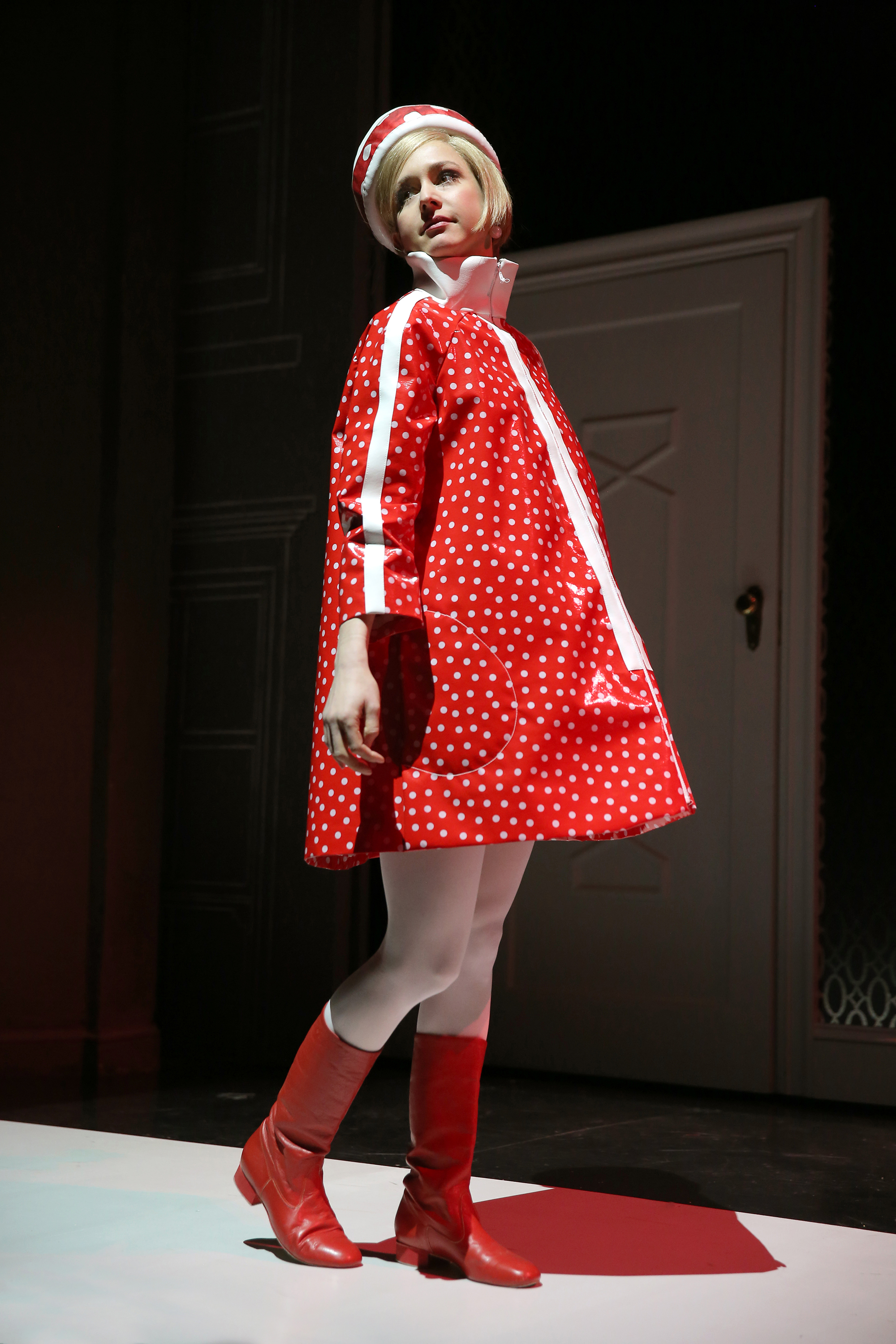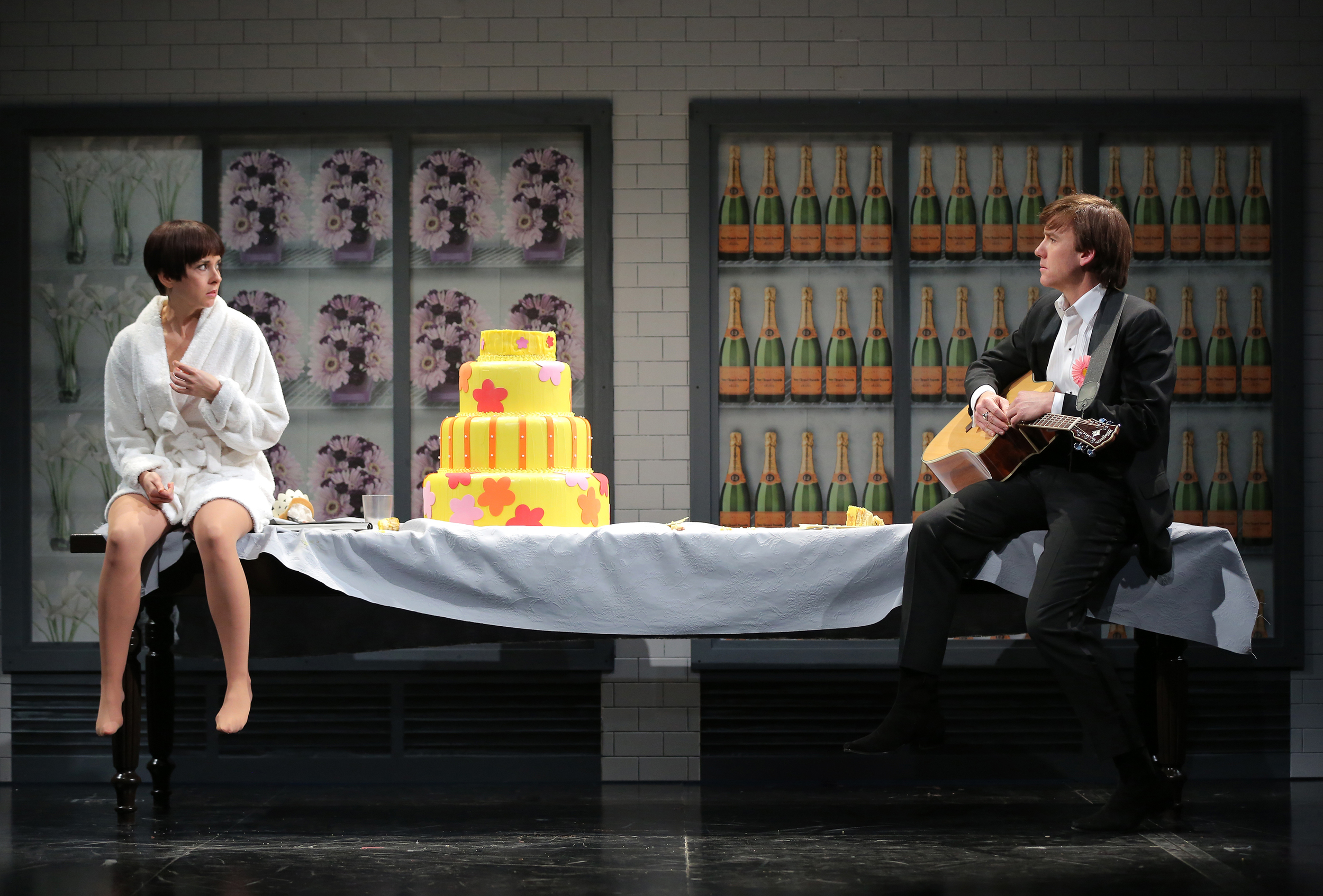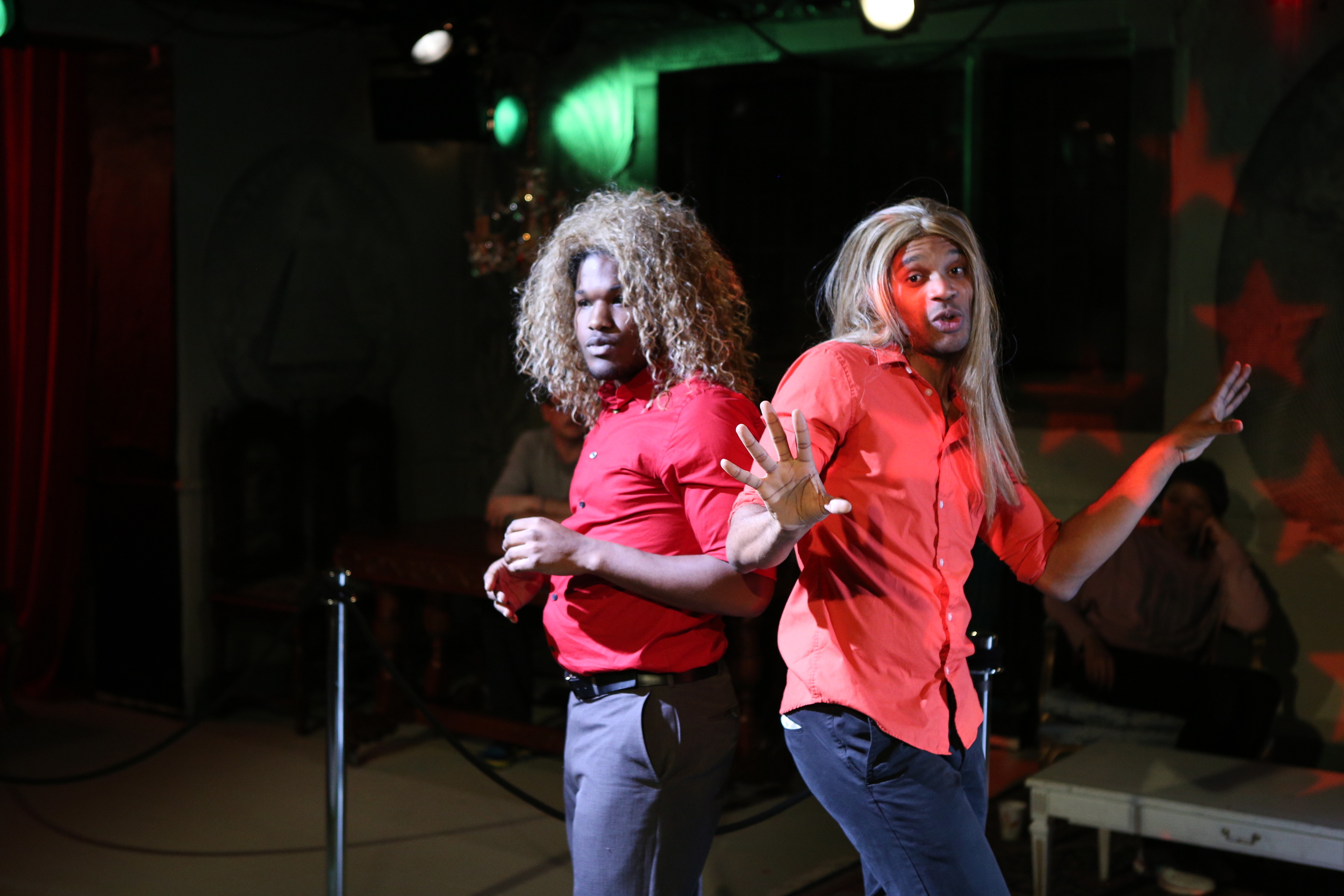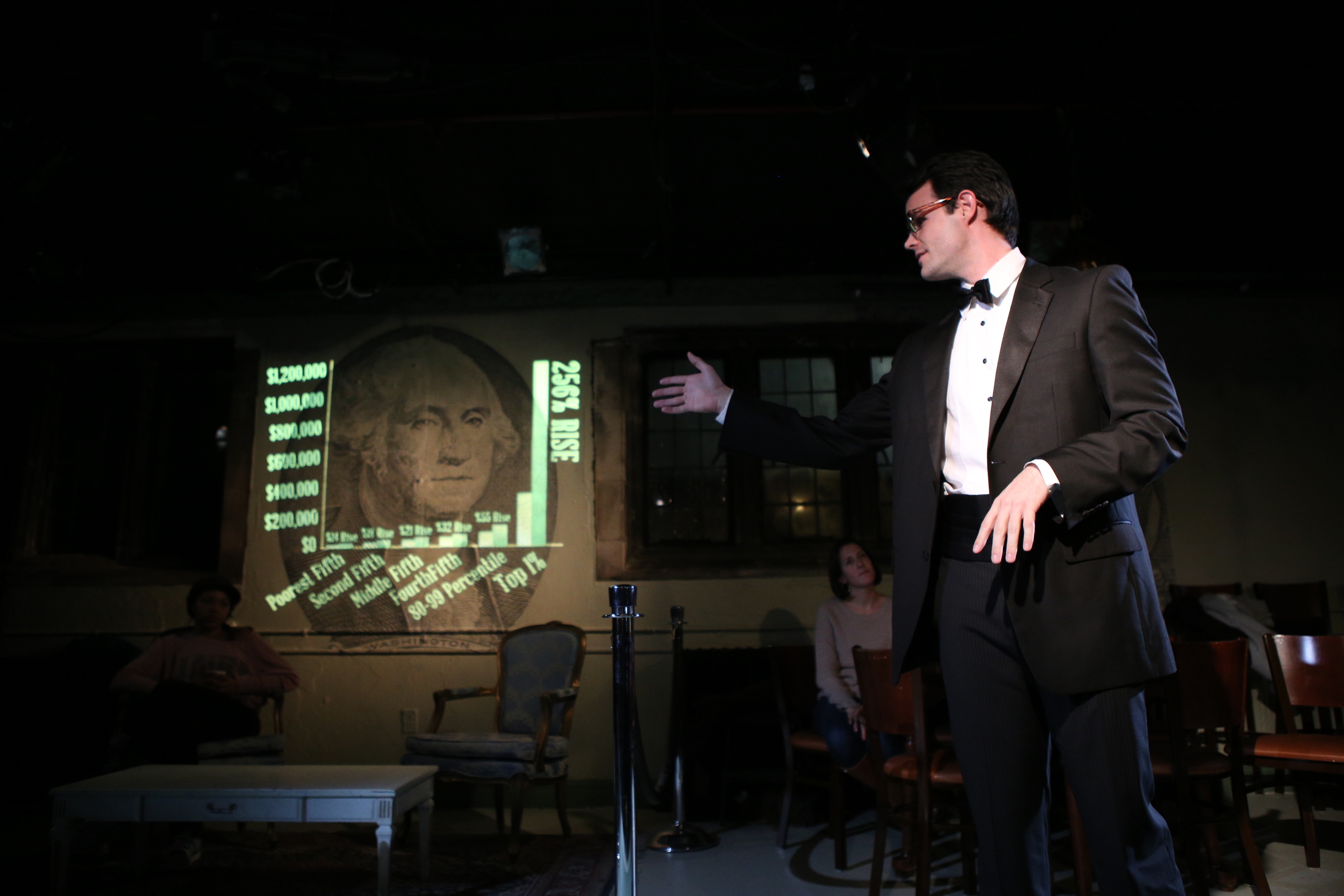Much Ado About Nothing, the comedy by Shakespeare that is the source for These! Paper! Bullets!, a new adaptation—or, in its terms, “modish ripoff”—by playwright Rolin Jones and director Jackson Gray, is somewhat silly, somewhat foolish, somewhat witty, and way too busy. The original play suffers from a surfeit of plots that don’t really add up to much—which is a way of saying their only purpose is to divert—and TPB takes that feature and runs away with it.
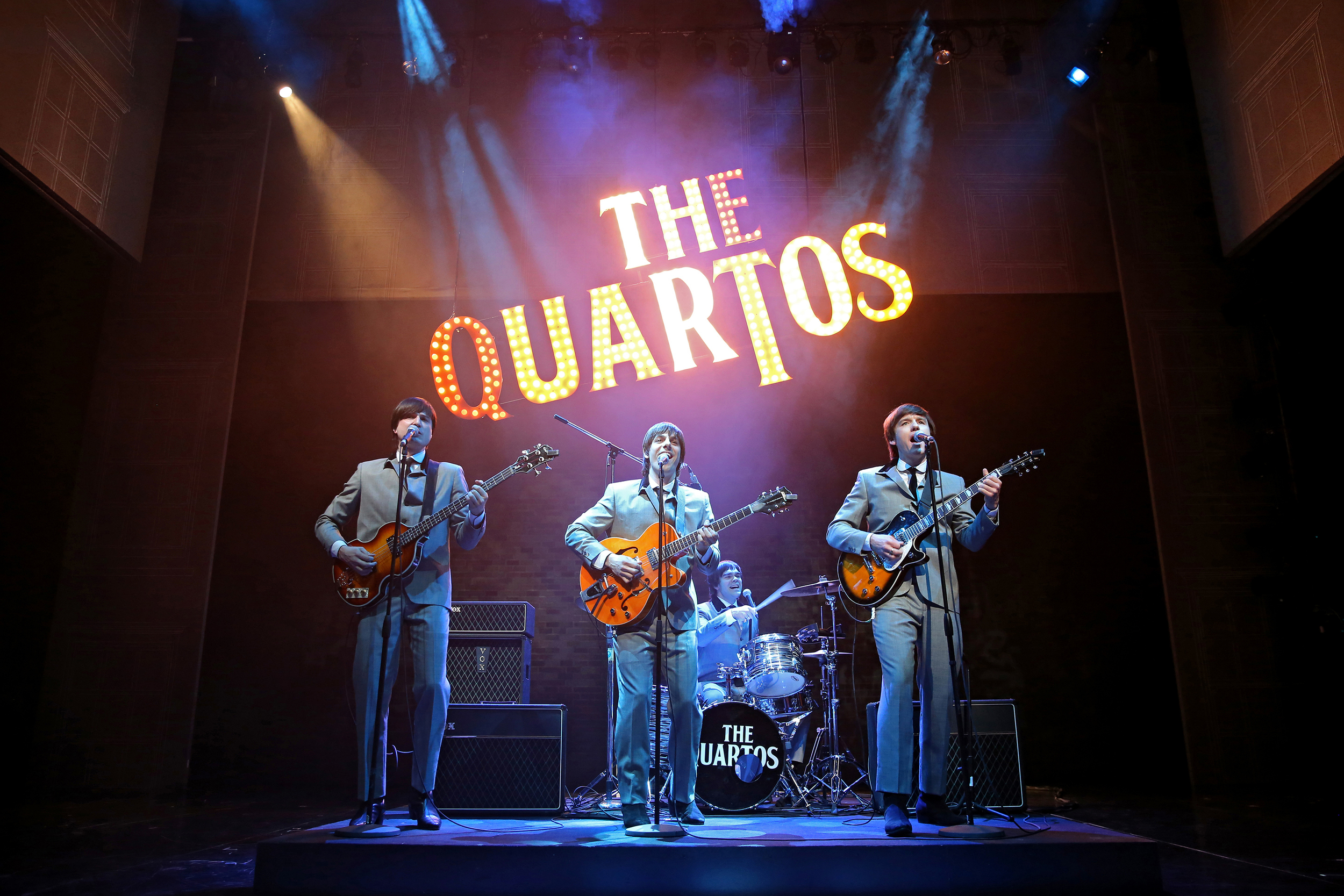
What makes TPB bigger than our Will’s conception is the driving force of this lively, tuneful, and sprawling production: pop culture in the form of the Fab Four—The Beatles. TPB takes us back to the days when the boys from Liverpool—not to mention numerous copies, clones, and wannabes—first assailed these shores. 1964, the key year of Beatlemania, found the Beatles riding as high as they would ever ride. “Bigger than Jesus,” John Lennon quipped (to considerable backlash), as does his likeness here: Ben (the firmly tongue-in-cheek David Wilson Barnes), the wittiest of the Quartos, aka Benedict in Much Ado. He wrangles, rom-com fashion, with Bea, otherwise Beatrice (Jeanine Serralles), a fashion maven á la Mary Quant. Meanwhile his mate Claude (Bryan Fenkart, the “cute one”) is speechless with his fancy for Higgy, née Hero (Ariana Venturi), a model whose skill, it seems, is to make questionable couture look desirable.
What Jones and company do so cleverly is mash the familiar tropes of Beatlemania—Liverpool accents, matching suits, moptops, screaming girls, fab gear, media circus, hummable numbers—with the giddy courtship shenanigans of Much Ado. And guess what? The Beatles biz beats the Bard.
Fans of the Beatles—and the Rutles—will find moments that recall some of the best banter of the former and some of the parodic tweaking of the latter. The gag album titles, the pastiche for pastiche’s sake in the projections (Nicholas Hussong) and costumes (Jessica Ford) and tunes (Billie Joe Armstrong) and stagings, including a “Hey Jude” rave-up and a “Get Back” rooftop shutdown, will keep those in the know on their toes. Jones even manages to include the one line that appears in both a Shakespeare play and a Beatles tune (indeed, it’s cribbed from a BBC Shakespeare production in the Beatles song). A good extra credit question for classes attending the show—and no fair Googling it. Even the name of the band—the Quartos—manages to combine the Beatles’ original name—the Quarrymen—with a Shakespearean association.
Indeed, TPB improves on Much Ado, but not quite enough. The Don John subplot—never very compelling—becomes funnier with ribs at Don Best (Adam O’Byrne), the early Quartos drummer who was dumped and bears a grudge, and the best parts of Much Ado—the eavesdropping scenes—are not surprisingly the best parts of the play here. But Much Ado’s Dogberry, here Mr. Berry (Greg Stuhr), still manages to dispense his tedium, opening the play, opening the second act, and getting into an interminable physical bout with his second in command, Mr. Urges (Brad Heberlee), and with the malefactors, Boris the journalist (Andrew Musselman) and Colin, a paparazzo (Brian McManamon), who are generally tedious company in their own right. I doubt even Monty Python could make these clods as comical as they need to be to justify their time onstage. Their only purpose, as ever, is to give the principals a breather. Me, I’d rather be backstage with the band.
Along the way, adaptation-wise, there are some happy inspirations: Jones cheekily (heh) adapts the mistaken identity plot by way of doctored photographs occasioning, quite rightly, a tabloid frenzy about the most eligible Quarto, while “all the world”—in the form of breathless TV reporter Paulina Noble (Liz Wisan) and her cameraman (Brad Heberlee), and even the Queen (Chris Geary, a welcome royal)—looks on. The Quartos themselves are reminiscent of the ersatz Beatles of the Saturday morning cartoon, with Lucas Papaelias nailing perfectly the deadpan adroitness of the George avatar. Meanwhile, Frida (Ceci Fernandez) and Ulcie (Keira Naughton) provide much of the amusement on the ladies’ side. Then there’s Jabari Brisport in Dionne Warwick drag because he can. Unlike The Rutles, Jones doesn’t go near the homosexual undercurrents in The Beatles entourage, as Brian Epstein (and Leggy Mountbatten) has been excised, and a dutiful George Martin type, Anton (James Lloyd Reynolds), runs the show.
Others have commented on how Jones and Gay improve on the sexual politics of Much Ado, with the Foursome getting a comeuppance for their double standard (yawn), but, oddly, the girls don’t fare so well here. Higgy is pretty much incoherent as a character, with the winsomeness of Much Ado’s Hero dropped in favor of party girl dimness—an improvement?—and Serralles’s Bea I could not warm to at all, as something of the role’s soul disappears as Bea is more apt to stuff wedding cake in her gob than appeal to anything more winning. You may find yourself waiting for Yoko. Or maybe Jones should take a cue from that other band of the era and work in someone a bit more Faithfull to the scene.
There’s so much going on in the show, you may easily breeze through without thinking about anything so Old School as character development, and the songs certainly help. There are knock-offs like “I’ll Give It All to You,” and big, rousing numbers like “Regretfully Yours,” that uses Fenkart to good effect, and even Ben trying to lay down a “Hide Your Love Away”-style soul-search, and mustn’t forget Stephen DeRosa’s infectious sing-along to “My Wild Irish Rose” as “impromptu” mugging to mask some scenery shifting. It’s a moment warm with the music hall repertoire that was a ready source for the Lads, and it serves here to reach out to the audience—as do moments like Wisan spotting celebrities in the seats (on opening night Athol Fugard was identified as Winston Churchill and graciously smoked an imaginary cigar on camera).
Full of a little something for anyone with fondness for British humour, or for humoring the Brits, These! Paper! Bullets! mostly hits what it aims at, though somewhere in the whirligig is a romantic-comedy about sex and celebrity in the Sixties—with the Fabs as the feckless flag-bearers—trying to “shed those dowdy feathers and fly, a little bit.”
These! Paper! Bullets! A Modish Ripoff of William Shakespeare’s Much Ado About Nothing Adapted by Rolin Jones Songs by Billie Joe Armstrong Directed by Jackson Gay
Choreographer: Monica Bill Barnes; Music Director: Julie McBride; Scenic Designer: Michael Yeargan; Costume Designer: Jessica Ford; Lighting Designer: Paul Whitaker; Sound Designer and Incidental Music: Broken Chord; Projection Designer: Nicholas Hussong; Orchestrator and Arranger: Tom Kitt; Dialect Coach: Stephen Gabis; Fight Director: Michael Rossmy; Production Dramaturgs: Ilya Khodosh, Catherine Sheehy; Casting Directors: Tara Rubin, Lindsay Levine; Stage Manager: Robert Chikar
Cast: David Wilson Barnes; Bryan Fenkart; James Barry; Lucas Papaelias; James Lloyd Reynolds; Adam O’Byrne; Jeanine Serralles; Ariana Venturi; Keira Naughton; Ceci Fernandez; Stephen DeRosa; Andrew Musselman; Brian McManamon; Jabari Brisport; Christopher Geary; Brad Heberlee; Liz Wisan; Greg Stuhr; Anthony Manna
Yale Repertory Theatre March 14-April 5, 2014
